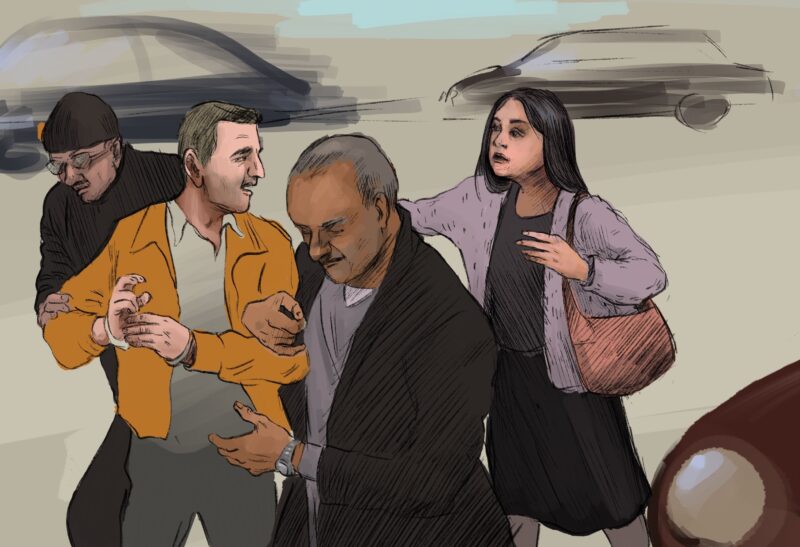According to local ecologists, landslides are some of Azerbaijan's biggest problems. Since the beginning of this fall, Azerbaijani experts report that the landslide zones have become active in the country again. Landslide activity has been recorded in a total of 400 population centers. A significant part of Azerbaijan's mountainous territory (which, incidentally, makes up more than half of the territory of the country) lies in the risk zone.
Just recently scientists at Azerbaijan's National Academy of Sciences (ANAS) discovered disturbances in parts of the north-eastern slopes of the Greater Caucasus that threaten new landslides and mudflows. There is a major ecological disturbance in the areas studied. Climate change is among the factors that cause an intensification in landslide activity.
What is climate change?
In recent years, everyone has been talking about climate change on our planet – it results in abnormal heat in some countries and unusually excessively harsh and snowy winters in others.
Global warming also leads to an imbalance in all natural systems – such as changes in precipitation patterns, temperature anomalies and an increase in the frequency of natural disasters like hurricanes, floods and droughts.
According to forecasts by scientists at the University of Ottawa, landslides will be one of the most devastating consequences of global climate change in the future. For example, over the past 50 years, the frequency of landslides on Canada's Arctic Banks Island, which was previously covered by permafrost, has increased 60-fold due to a rise in global temperature.
The warming in the Alps and in the Caucasus has resulted in glaciers halving, and this has enlarged landslide zones in Azerbaijan as well.
"About a quarter of Azerbaijan's territory is favorable for landslides to develop. Landslides occur in our country at any time of the year, but they mostly happen in spring and summer. During that period, along with the melting of snow and spring rains, soil movements in almost all mountain zones intensify," says Stara Tarihazer, leading researcher at the Landscaping and Landscape Planning Department of ANAS,
“There was very loud noise, the earth started to shake”
"A landslide occurred when it was raining. The house fell into earth before my very eyes. There was very loud noise, dust rose, and we suddenly saw that the house was not there," says Sevda Mahmudova, a resident of the village of Gyulazi in Azerbaijan's Guba region. The landslide hit the village in 2010.

Mountains make up most of Guba District, and landslides are a fairly frequent occurrence there. Each year, the country's agencies report numerous landslides occurring in different villages of the district.
Heavy precipitation normally precedes the intensification of landslide activity.
Dozens of homes were affected by the landslide in the village of Gulazi. Several homes "were razed to the ground", local residents said. The village's cemetery was almost completely destroyed.
The government then decided that it was dangerous to live there. It was then that the construction started of a new 80-home (just as many homes as in Gulazi) village in a safer part of Guba District. The village was given the name Yeni (New) Gulazi. Residents of the landslide-hit village were to relocate to the new village.

Many relocated almost immediately. People, however, continue to live in the "old" Gulazi. Overall, the village, which is located in the mountains and boasts a beautiful view of the nearby mountains and valleys, does not make you feel distressed, unlike when you are looking at the homes destroyed by the landslide.

There are large cracks on the walls of almost all of the homes, with many of the houses sagging heavily and tilted. The school building was badly damaged, too.

A local resident, Sevda Mahmudova's daughter-in-law, volunteered to give us a tour of the village. She showed us a place where several residential buildings and the village club were "wiped off the face of the earth". It is now hard even to imagine that there once were buildings on this land which is already covered in grass and bushes.

Baku is another risk zone.
The regions are not the only ones affected by landslides in Azerbaijan. Several landslide zones have been recorded in the capital city, Baku, as well. When the current fall season started, specialists from the Department for Comprehensive Monitoring and Hydrogeological Research traditionally sounded the alarm. Monitoring that they conducted in September showed that the activity of landslide areas on the Absheron peninsula had intensified again.

An active landslide process has been observed on the Bayil slope in Baku since late 2017. At the time, 80 families were evacuated from homes in the dangerous area. In May 2018, the landslide intensified again, and people living in 22 unsafe houses were evacuated. In early 2019, it was announced that there were plans to demolish 98 houses.

According to official reports, landslides in Azerbaijan annually destroy hundreds of homes and cause the country damage to the tune of 20 to 30 million AZN (12 to 18 million USD).
Human Involvement
Specialists say that human activities also result in the intensification of landslide activity. Those activities are the unplanned construction of roads, and development of infrastructure: multi-story buildings, pipelines, roads, canals, and reservoirs.
The process occurs in the following way:
"The soil absorbs moisture, but there is clay beneath it. It is heavy, slippery like vaseline, the water goes in there, the clay swells and the earth cannot bear that weight and starts sliding down, and buildings erected on it collapse," ecologist Telman Zeynalov told Meydan TV. For humans not to provoke the occurrence or intensification of a landslide process, all construction work should be carried out with the probability of landslide processes taken into account, many local ecologists believe.
Telman Zeynalov is more categorical on this matter. "You cannot build homes in a landslide zone. If there are plans to erect a building or develop the agriculture in an area that is hilly, specialists need to be consulted, the situation needs to be examined, and groundwater and the soil need to be examined. If there is heavy clay above the rockbed, you cannot build anything on that spot, nor can you plant anything," he argues.
No life without land
Few people have remained in the landslide-hit village of Gulazi. Those who do live there all year round. A local resident, Gandab Askerova, says that they decided not to leave because their house remained intact unlike their neighbor's house, one of whose walls completely collapsed.

"This is my husband's cousin's house," she says. "They were very unlucky. They had just renovated the house and this happened. They were one of the first ones to leave. What else could they do?" Gandab adds that her family are not going leave. Although experts from relevant agencies visited them recently to warn them that it was still very risky to stay there for long because landslides are unpredictable. "We will stay here till the end," she adds.

Land is the main reason why the villagers continue to stay in this village at their own peril and risk.
"Yes, they built us houses. There is gas, electricity, and water. But unlike here, there are no land plots there," Sevda Mahmudova says. "There is no room there to plant or sow or to graze our herd."
And even those who relocated and do not live in Gulazi all year round continue to earn their income from this land. "They arrive for summer vacations, sow and plant, collect the harvest and leave," Gandab says.
–
Supported by the Russian Language News Exchange



